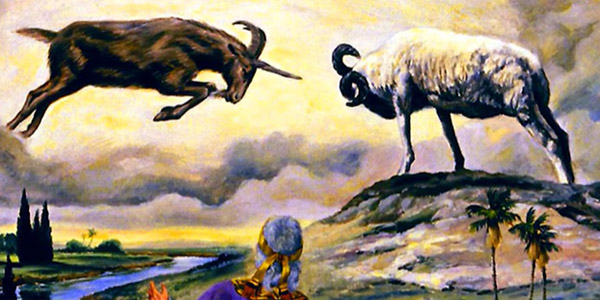Daniel 8:1-14 Click here for Bible Verses

Hi GAMErs!
Today’s passage is Daniel 8:1-14. Let’s go!
Daniel 8:1-8 (NIV)
1 In the third year of King Belshazzar’s reign, I, Daniel, had a vision, after the one that had already appeared to me.
2 In my vision I saw myself in the citadel of Susa in the province of Elam; in the vision I was beside the Ulai Canal.
3 I looked up, and there before me was a ram with two horns, standing beside the canal, and the horns were long. One of the horns was longer than the other but grew up later.
4 I watched the ram as he charged toward the west and the north and the south. No animal could stand against him, and none could rescue from his power. He did as he pleased and became great.
5 As I was thinking about this, suddenly a goat with a prominent horn between his eyes came from the west, crossing the whole earth without touching the ground.
6 He came toward the two-horned ram I had seen standing beside the canal and charged at him in great rage.
7 I saw him attack the ram furiously, striking the ram and shattering his two horns. The ram was powerless to stand against him; the goat knocked him to the ground and trampled on him, and none could rescue the ram from his power.
8 The goat became very great, but at the height of his power his large horn was broken off, and in its place four prominent horns grew up toward the four winds of heaven.
On verses 1-8: While King Belshazzar was still king of the Babylonians, Daniel receives another vision, this time of an aggressive two-horned ram (representing two kings of Medo-Persia – v20) who is defeated by a large-horned goat (representing Greece – v21). Some scholars equate the large horn with Alexander the Great. As powerful as Alexander the Great had become, his kingdom would eventually be divided into four parts to be ruled by four of Alexander’s generals, just as in verse 8 this large is broken off and in its place four prominent horns grow up.
Daniel 8:9-12 (NIV)
9 Out of one of them came another horn, which started small but grew in power to the south and to the east and toward the Beautiful Land.
10 It grew until it reached the host of the heavens, and it threw some of the starry host down to the earth and trampled on them.
11 It set itself up to be as great as the Prince of the host; it took away the daily sacrifice from him, and the place of his sanctuary was brought low.
12 Because of rebellion, the host [of the saints] and the daily sacrifice were given over to it. It prospered in everything it did, and truth was thrown to the ground.
On verses 9-12: Here Daniel’s vision now focuses on a little horn whose influence begins small but grows to the point that he takes away the people’s systems for worshiping the Lord. Some scholars have equated this little horn with the Antichrist. Others have equated this little horn with Antiochus IV Epiphanes who in 171 B.C. took over the Greek empire and was known for his exploits “to the south” (Egypt), “to the east” (Persia) and “toward the Beautiful Land” (Palestine). Antiochus was known for his intense persecution of the Jews. He became famous for desecrating the temple in Jerusalem by burning Scripture, placing a statue of himself in the temple, butchering a pig on the temple altar, smearing its blood on the temple walls and forcing the priests to drink the rest of it.
Daniel 8:13-14 (NIV)
13 Then I heard a holy one speaking, and another holy one said to him, “How long will it take for the vision to be fulfilled–the vision concerning the daily sacrifice, the rebellion that causes desolation, and the surrender of the sanctuary and of the host that will be trampled underfoot?”
14 He said to me, “It will take 2,300 evenings and mornings; then the sanctuary will be reconsecrated.”
On verses 13-14: It has been said that Antiochus’ reign began on September 6, 171 B.C. Then 2,300 days later (just as Daniel saw in his vision), on December 25, 165 B.C., Antiochus’ reign ended when five sons of a Jewish man whom Antiochus killed led a successful rebellion called the Maccabean Revolt. The Jews then repossessed the temple in Jerusalem, relighting its candles. This event is known as Hanukkah, the Jewish feast of lights.
What can learn from all this?
1. Assuming that Daniel wrote down these visions centuries before the Greek empire came to power, the prophetic revelations that the LORD gave Daniel are astounding in terms of their accuracy and precision. God holds the future in His hands and He is able to reveal parts of them to whomever He pleases.
2. Men like Alexander the Great and Antiochus enjoyed a great deal of power and prestige in their prime, but they eventually died and their kingdoms did not last. Jesus Christ is the only king who will never again die and whose kingdom will never be divided or taken away.
Thank You Father that I get to serve the only eternal king who will never die: Your Son Jesus Christ. In Jesus’ name, AMEN!

